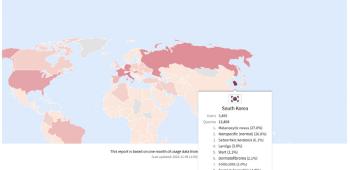Why do you have a cerebral infarction in the summer? It turns out that...
Aug 04, 2025
|
In summer, heat diseases, water-related ear inflammation, and conjunctivitis can be considered, but cerebral infarction with clogged cerebrovascular is also a disease to be careful in summer.
Cerebral hemorrhage has a high incidence during the change of seasons when temperature changes are large, but cerebral infarction increases in summer. It's because of the heat. This is because when dehydration occurs due to heat, moisture escapes from our body, making blood vessels more easily clogged.
Kim Hyun-gon, head of the neurosurgery department at Bundang Jesaeng Hospital (Hospital Director Na Hwa-yeop), explained, `When the temperature rises, a large amount of moisture is released through sweat to lower the body temperature, which increases the viscosity of blood and increases the likelihood of blood clots.' `In the process of lowering the body temperature, blood vessels expand, resulting in decreased blood pressure and blood flow rates, which also slows blood circulation.'
In summer, blood vessels expand to lower elevated body temperature due to high temperatures, which slows blood flow to brain cells, causing poor blood supply. In addition, when the amount of water in the body decreases due to dehydration, the viscosity of the blood increases and blood clots are more likely to occur. When blood clots, commonly referred to as 'Pitteok', travel around blood vessels and block cerebrovascular vessels, they cause cerebral infarction.
Manager Kim Hyun-gon said, `If you usually suffer from high blood pressure or have a family history of diabetes, arrhythmia, and stroke, you should pay more attention to strokes in the summer. In addition, when you suddenly go outside with a high temperature while your body temperature drops due to indoor cooling, a sudden temperature difference may cause your sympathetic nerves to become excessively active and blood vessels to contract, increasing the risk of stroke," he added.
In order to prevent stroke in summer, sufficient water intake and excessive temperature changes should be avoided, and careful health care is essential for high-risk groups.
Manager Kim Hyun-gon said "Stroke is a cerebrovascular disease that involves various neurological deficits in the brain due to the blockage or bursting of blood vessels that supply blood to the brain, causing damage to cells that were receiving blood flow. When a stroke occurs, various symptoms such as headache, paralysis, speech impairment, and loss of consciousness can occur, and prevention is important because you can live with disabilities for life as a result of the aftereffects.
Temperature control is important to prevent stroke in summer. During the daytime when the temperature is high, refrain from outdoor activities, and set an appropriate temperature so that the body temperature does not drop too much in indoor cooling and ventilate regularly to circulate the internal air. In addition, it is helpful to drink water frequently, avoid heavy drinking and smoking, and to consume enough watery foods such as vegetables and fruits.
To prevent cerebrovascular disease, lifestyle improvements such as maintaining healthy eating habits, regular exercise, smoking cessation, stress management, blood pressure and blood sugar management are very important for preventing cerebrovascular disease, and if one paralysis or speech disorders suddenly appear, an emergency room should be visited immediately.
|
This article was translated by Naver AI translator.















